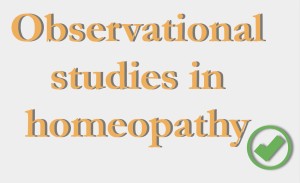Do observational studies have relevance in measuring the outcomes of homeopathic treatment?
Aurum Project article published in the journal of the Australian Traditional Medicine Society. Author Linlee Jordan
Abstract
With international interest pushing the growth of homeopathy, there is a parallel push for more research. Some authors dispute the idea that randomised controlled trials are the optimum research method for homeopathy research. Difficulties lie in attempting to measure homeopathic treatment because the practice remains highly individualized, and in chronic cases the response in early treatment must not be confused with the outcome of treatment, as illustrated by Hering’s Law. The outcomes of treatment in real-life settings when measured by patient satisfaction surveys about quality of life changes have presented positive evidence in many studies. This is the information which the 2011 Swiss government report used to affirm that homeopathic treatment should be reimbursed by Switzerland’s national health insurance program. Observational studies were deemed not only enough to show that patient satisfaction is high and that homeopathy improves quality of life but also were seen as a highly relevant and important measurement tool not to be dismissed as low in the hierarchy of significance in homeopathy research.
Homeopathic medicine around the world
Around the world, homeopathy is one of the four most widely used complementary and alternative medicines (CAM). There is a clear increase in usage of homeopathic medicine over time, with widespread application in Germany, Switzerland and Italy, and a rapidly growing use in developing countries, including a number in Africa. The Pan-African congress in 2012 lived up to its name and drew participants from Mombasa, Swaziland, Ghana, Tanzania, Malawi, Sierra Leone and a number of other African states. The keynote speaker said that homeopathy “strikes a chord” with the wider African population due to their traditional belief systems, which already accept the basic principles of energetic medicine.
Brazil has an estimated 12,000 homeopathic physicians.
In 1980 the Brazilian Medical Association recognized homeopathy as a medical speciality. In 1988 the Government recognized homeopathy and included it in the National Health System. Homeopathy is also popular in many other South American countries.
India is the largest user of Homeopathy
The largest homeopathic infrastructure in the world is found in India, which has an estimated 300,000 homeopaths in practice. Although generally there is a global, demonstrable increase, certain countries such as the UK and Norway show a reduction in numbers of consultations. Likewise, a reduction has occurred in Australia even though a survey by the Complementary Healthcare Council found Australians spent $US7.3 million on homeopathy in 2008. With international interest pushing the growth of homeopathy there is a parallel push for more research coming from practitioners, regulating bodies, professional associations, governments and sceptics alike. Debate about the most suitable research
methods continues.
In orthodox medicine the optimum research method for proving whether or not a medical intervention works is held to be a randomised controlled trial (RCT), in which one group of patients, the control group, receives placebo or standard treatment, and another group the medicine or intervention being tested. The trial becomes double-blind when neither the patient nor the practitioner knows which treatment the patient is getting. RCTs are often referred to as the “gold standard” of clinical research.
Observational studies are supposedly less exalted than the RCT
In answer to the call for more homeopathy research, RCTs have been used to test the worth of homeopathy. However many homeopaths contend that RCT methodology is not suited to researching homeopathy and that supposedly less exalted observational study methods are. The research world has put the observational study near the bottom of the hierarchy of evidence. Some authors dispute the justice of this and have presented positive evidence from conducting
patient satisfaction surveys about quality of life changes within the framework of an observational study. This paper presents homeopathic research using observational studies and asks, “Do observational studies have relevance in the measurement of the outcome of homeopathic treatment?”
Patient satisfaction surveys
Notwithstanding wide variations in usage around the world, patient surveys show consistency in the reasons why people
choose homeopathic medicine as a form of treatment, including dissatisfaction with the results of conventional treatment, the adverse effects of drugs, and the invasiveness of conventional medicine. In developing countries cost effectiveness is a major reason for the choice of homeopathy. In Italy, where homeopathy is the most commonly used CAM, cost effectiveness is not listed as the major concern and the main reason for choosing it is the “potential toxicity” of conventional medicine.
We know that users of homeopathy tend to be more critical of medicine in general and also tend to lead healthy lifestyles, so this needs to be taken into account when reviewing patient surveys. Even so, the outcome of surveys makes it clear that once the initial consultation is over, the reasons that people return to homeopathy are straightforward: it works for them, they can see and feel its effectiveness, they like the good care offered by homeopaths, they like being listened to, homeopathy fits in with their own world-view, and they have been encouraged to have greater responsibility
for their own health.
Patient satisfaction is high for users of homeopathy
Generally, patients are highly satisfied with their care. Patient satisfaction surveys measuring quality of life are increasingly used alongside clinical measurements in the monitoring and evaluation of health care. This is a step forward when we are considering measuring the outcome of homeopathic treatment, since there has been a long debate about the validity of different measurement methods. This ideological and scientific struggle between homeopathy and orthodox medicine has lasted for 200 years. A major part of the debate stems from the fact that homeopathic medicine has the capacity to work in a holistic fashion. Homeopathic medicine works on physical problems as well as changing something about how the person feels, “to cast off the chains of habit” and shift their perceptions.
The results of attempts to measure these changes are sometimes illuminating and often ambiguous, which fuels the controversy. Homeopathy remains highly individualised for the patient and complexly non- standardised for the practitioner.
Reference: Jordan L. Do observational studies have relevance in measuring the outcomes of homoeopathic treatment? JATMS. 2013;19(3):146-153.

